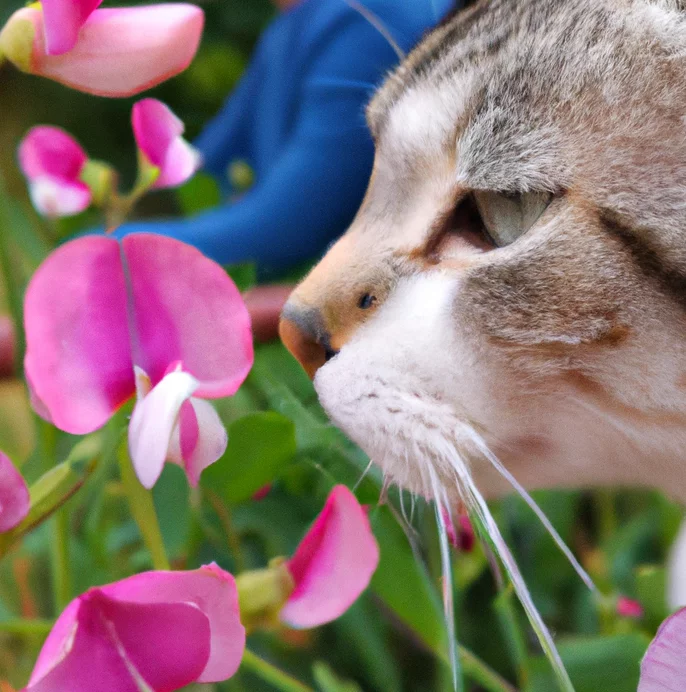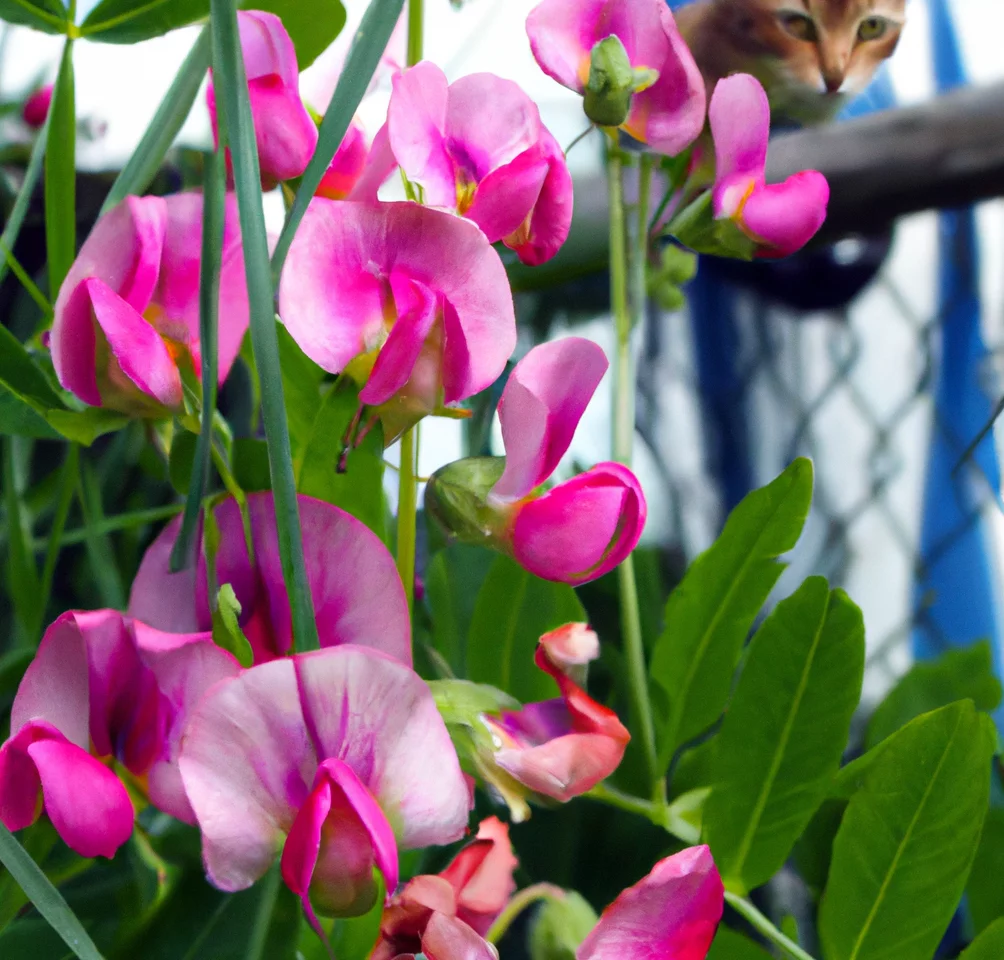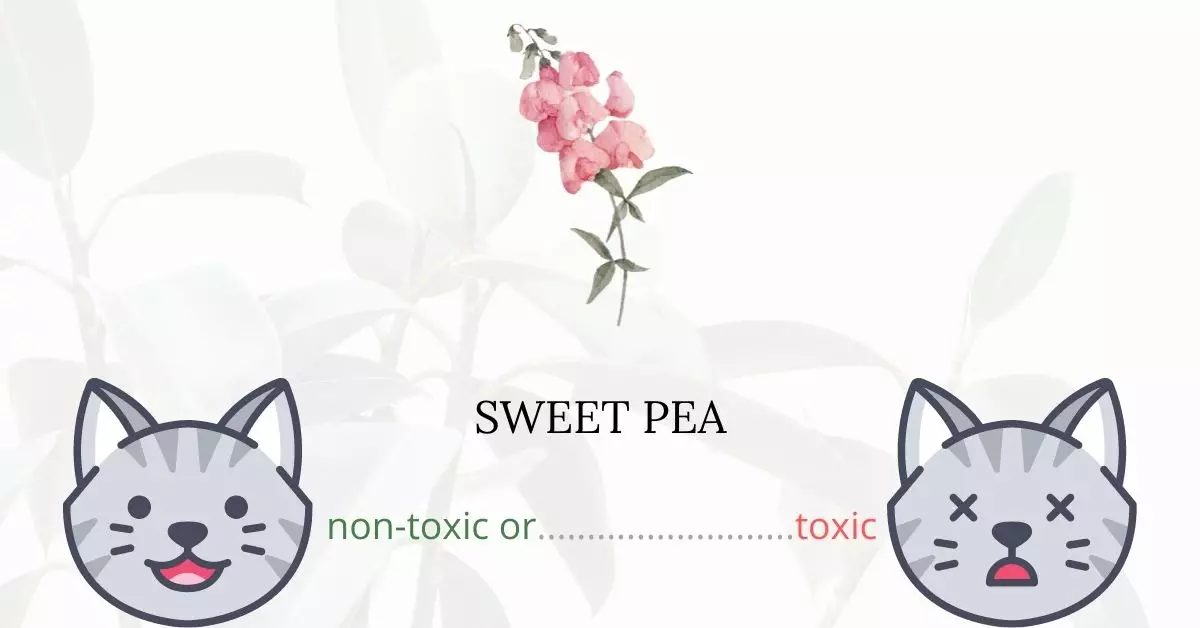Sweet peas are indeed toxic to cats, posing significant risks if ingested. They contain a compound known as aminopropionitrile, which obstructs the body’s ability to repair muscles and connective tissues by hampering collagen formation. Every part of the sweet pea plant has the potential to cause harm, predominantly triggering gastrointestinal disturbances in cats, which thankfully deters them from consuming large quantities.
This article has been meticulously compiled in collaboration with a panel of seasoned Doctors of Veterinary Medicine (DVMs), whose invaluable insights have enriched the content with accurate and current information on the possible dangers of sweet peas, among other plants, to cats. Their expertise enables us to present a comprehensive overview of the deleterious effects of sweet peas on feline companions. In addition, we have referenced high-authority sources, such as ASPCA and PetMD, to ensure the reliability and preciseness of every piece of information provided regarding each plant discussed. We aim to aid pet owners in making informed decisions and to foster a safe environment for their pets.
Clinical Signs of Sweet Pea Poisoning in Cats

When a cat comes into contact, inhales, or consumes the Sweet Pea plant, it typically manifests signs of poisoning swiftly, primarily impacting the nervous system. Understanding the reasons behind each symptom can help in quicker identification and response.
- Vomiting: This occurs as the body’s immediate reaction to expel the toxic elements of the Sweet Pea plant, attempting to purge the ingested poison from the system. It’s often one of the first signs pet owners might notice.
- Diarrhea: The ingested toxins can irritate the cat’s gastrointestinal tract, leading to increased bowel movements, signifying the body’s endeavor to get rid of the harmful substances.
- Lethargy and Weakness: The toxins in sweet peas interfere with collagen synthesis, affecting the muscles and connective tissues, leading to generalized weakness and lethargy as the body struggles to cope with the damage.
- Tremors: The impact of the toxins on the nervous system can lead to involuntary muscle contractions or tremors, signifying neurological impairment.
- Seizures: Extreme cases of sweet pea poisoning may result in seizures due to severe neurological involvement, signaling excessive damage to the nervous system.
- Sudden Death: In highly severe cases, where the quantity ingested is substantial or intervention is not swift, it could tragically result in sudden death due to systemic failure induced by the toxins.
Each of these signs is indicative of the body’s distress and its struggle to combat the ingested toxins, and immediate veterinary intervention is crucial upon noticing any of these symptoms to prevent irreversible damage and potentially save the cat’s life. Observing the cat’s behavior and being aware of any abnormal changes can aid in early detection of sweet pea poisoning, allowing for prompt action and treatment.
First Aid and Treatment of Sweet Pea Poisoning in Cats

Sweet pea poisoning is frequently treated with supportive intravenous fluid and nutritional therapy in mild instances. To eliminate the toxin from your cat’s gastrointestinal tract, your veterinarian may induce vomiting. Activated charcoal can also help your cat’s stomach absorb the poison. If your cat is vomiting frequently, your veterinarian may prescribe anti-vomiting or anti-nausea medicine. To treat seizures and other symptoms, various drugs may be recommended.
Recovery from Sweet Pea Poisoning in Cats

The severity of the poisoning and how soon it was treated can affect recovery and prognosis. Most cats recover from minor plant poisoning in a few hours. The prognosis for severe poisoning is uncertain.
Prevention of Sweet Pea Poisoning in Cats
If your cat was poisoned by sweet pea while outside, you should limit your cat’s outside activity to minimize further poisonings. Remove the sweet pea as soon as possible if you bought or cultivated it as a home or garden plant. Research first before buying any plants to be sure they don’t contain any potentially dangerous compounds for your cat.
If you love plants but have cats at home, check out these lists:





